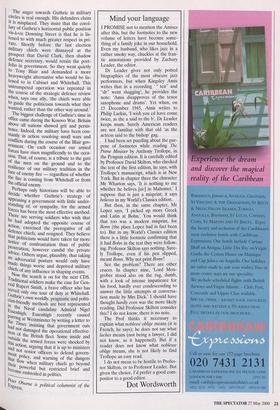Mind your language
I PROMISE not to mention the Amises after this, but the footnotes to the new volume of letters have become some- thing of a family joke in our household. Even my husband, who likes jazz in a rather smoky way, chuckles at the fran- tic annotations provided by Zachary Leader, the editor.
Dr Leader gives not only potted biographies of the most obscure jazz performers, but when Kingsley Amis writes that in a recording " ten" and "dr" went shagging', he provides the note: 'Amis disapproves of the tenor saxophone and drums'. Yet when, on 15 December 1945, Amis writes to Philip Larkin, 'I wish you cd have come twice, as the a said to the b', Dr Leader keeps mum. Surely American readers are not familiar with that old 'as the actress said to the bishop' gag.
I had been set puzzling about the pur- pose of footnotes while reading The Prime Minister by Anthony Trollope, in the Penguin edition. It is carefully edited by Professor David Skilton, who checked the text of the first edition, he says, with Trollope's manuscript, which is in New York. But in chapter three the character Mr Wharton says, 'It is nothing to me whether he belives [sic] in Mahomet.' I suppose that is just a misprint; it says believes in my World's Classics edition. But then, in the same chapter, Mr Lopez says, 'I picked up more Greek and Latin at Bohn.' You would think that too was a modern misprint, for Bonn (the place Lopez had in fact been to). But in my World's Classics edition there is a little footnote confirming that it had Bohn in the text they were follow- ing. Professor Skilton says nothing. Sure- ly Trollope, even if his pen slipped, meant Bonn. Why not print Bonn? See the problem? There are other cruces. In chapter nine, 'Lord Mon- grober stood also on the rug, dumb, with a look of intense impatience for his food, hardly ever condescending to answer the little attempts at conversa- tion made by Mrs Dick.' I should have thought hardly even was the more likely reading. Did Professor Skilton consider this? I do not know; there is no note.
The Prof thinks it necessary to explain what noblesse oblige means (it is French, he says); he does not say what laches means (not being a lawyer, I did not know, as it happened). But if a reader does not know what noblesse oblige means, she is not likely to find Trollope an easy read. I do not mean to be hostile to Profes- sor Skilton, or to Professor Leader. But given the choice, I'd prefer a good com- positor to a good editor.
Dot Wordsworth


































































 Previous page
Previous page